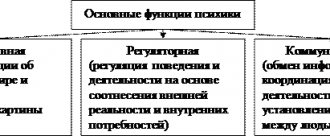Hello blog readers! Emotions are a part of our life. How we behave, what feelings we show and what we hide is one of the most striking human characteristics. However, a person’s emotional behavior can both attract and repel. Thus, excessive expression of feelings often causes rejection and hostility.
How does an emotional person stand out from the crowd and what is associated with increased emotionality?
What is character?
Every person has a character, and by it we mean a set of individual traits inherent in a particular individual. There is a gradation to describe a person’s character, depending on the mental properties of the individual.
- Attitude towards other people
- respect, responsiveness, sociability or the opposite - contempt, isolation, callousness. - Attitude to work
- responsibility, accuracy, hard work or laxity, dishonesty, laziness. - Attitude towards oneself
– modesty, self-criticism or arrogance, vanity. - Attitude to objects
- neatness, thrift or sloppiness, negligence.
Showing emotion
A person’s emotional world depends on a combination of factors that form his personality type.
- Level of excitability. Despite the fact that this factor is more neurophysiological in nature, it is also associated with the emotional sphere. We can trace a direct relationship: the more excitable a person is, the more emotional he behaves. His speech is full of descriptions, and the narration constantly gets confused. The fact is that this process is associated with the strength and speed of nervous processes.
- Depth and strength of experience. Usually creative people are the most impressionable and receptive in life. For creative professions, energy and dedication during work are very important. For example, it is important for an artist to play his role believably, and for an artist to express his thoughts on canvas. However, quite often excessive emotionality and feelings lead to devastation and creative burnout. Therefore, it is very important to replenish energy on time.
- Emotional stability. Some people leave 10 minutes after an argument, and some people relive this moment over and over again. If nervous excitement persists for too long, it can lead to psychological problems. While rapid changes in mood reveal a person’s fickle nature with increased emotionality.
- Expressiveness. A person’s reaction to any events may be small, but his desire to show others his attitude and emotions can be many times greater than his own feelings. Quite often, expressiveness is mistaken for excessive emotionality, but in reality a person does not experience emotions, but rather plays them in front of an audience.
The combination of the above factors forms one or another type of personality. In addition to individual characteristics, external factors also influence personality type.
Pros of highly emotional people
Of course, a person’s emotional activity is largely determined in childhood and it is very difficult to change it. But human emotional needs are the same. Everyone wants to have fun and enjoy their free time. It’s just that some people prefer a large and noisy company, while others prefer to spend the evening at home listening to their favorite TV series or book.
Emotional people always attract attention. This can be intimidating for introverts, but vice versa for extroverts. But there are definitely advantages to communicating with such people. And here are some of them:
- They are friendly. With them you can always find a common topic and not experience awkward silence.
- Love for everything joyful is their distinctive feature. They look for the good in everything, and, oddly enough, they find it.
- They don't manipulate people. Playing behind-the-scenes games is not their thing. Due to their fast stream of consciousness, they are quite simple-minded.
- Sincerity. If they think highly of someone, they will tell you. And if they think bad about someone, they will tell you too! This is their nature; keeping thoughts to themselves is not about them.
- Easy to climb. Trying something new is something they enjoy. After all, new hobbies always cause a storm of new emotions.
External factors
A great emotional impact on a person comes from outside. Depending on lifestyle, social circle, work and other aspects, a person experiences influences that can change his personal characteristics.
Of course, the main thing that we absorb into ourselves is laid down in childhood. So, upbringing determines who a child will grow up to be: a self-confident person or a hysterical and unbalanced person.
But even an adult individual experiences psychological stress that can turn his emotional processes around. These include:
- Prolonged stress.
- Emotional shock or mentally traumatic situation.
- A state of helplessness and uselessness that occurs in the absence of self-realization.
- Hormonal imbalance in the body.
- Alcohol addiction.
- Head injuries.
Quite often, these factors cause depression and apathy, as a result of which a person begins to be aggressive and embittered.
But it is worth noting that external factors can also restore tone to the emotional state. For example, a person’s experiences of entering a university ended when he saw his name on the list of applicants. In this case, a person’s ability to act proves to him that all his efforts were not in vain. This gives rise to euphoria and a feeling of joy.
This is a natural example when external factors bring events with a “+” sign into life.
But if a person is in this state for no apparent reason, this may mean a mental disorder.
Among the emotional characteristics of a person with a “+” sign, but pathological, one can name moria. This is a condition in which a person constantly fools around, feels no shame, acts chaotically, talks and laughs non-stop.
A person experiences a similar condition when intoxicated by alcohol or when there is damage to the frontal lobes of the brain, which are responsible for control and rationality.
Thus, a long-term change in a person’s emotional mood should alert his loved ones. This may be a serious cause for concern.
Human character types
The human nervous system, which determines his temperament, is responsible for the formation of character. Temperament distinguishes the types of human character. This classification was described by Hippocrates and Galen, doctors from Ancient Greece. Their theory is based on the fact that the character of an ordinary person can be divided into four types:
- a melancholic person
is characterized by sensitivity, emotionality, and touchiness; - sanguine
– love of life, sociability; - phlegmatic
– seriousness, poise; - choleric
– persistence, nervousness, imperiousness.
How to find out a person's character?
People are always interested in the question of what signs can be used to find out what kind of character a person has. Curious about whether a name influences a person’s character, experts have noticed some signs that are common to people with the same names. Some people believe that character traits can be determined by:
- date of birth;
- handwriting;
- facial features.
Personal character by date of birth
You can determine a person’s character by the date he was born if you take into account what zodiac sign he belongs to. You can find out the character of people using a horoscope - this is a special system that divides the year into 12 zodiac signs, each of which has its own distinctive character traits.
- Aries
are ardent and passionate natures, creative people filled with living energy. - Taurus
are unyielding, prudent and patient. - Geminis
are curious, inventive and sensitive. - Cancers
are vulnerable, attached to loved ones, emotional. - Leos
are passionate, sociable, strong. - Virgos
are insightful, self-critical, methodical. - Libra
is diplomatic, balanced, gentle. - Scorpios
are powerful, strong-willed, mysterious. - Sagittarians
are honest, inquisitive, good-natured. - Capricorns
are conscientious, ambitious, purposeful. - Aquarians
are independent, friendly, stubborn. - Pisces
are sensitive, compassionate, and punctual.
Character of a person by handwriting
Every person has their own unique handwriting. Graphology is a science that helps determine a person’s character by the way they write letters and symbols. To understand how to determine a person’s character by handwriting, you need to ask him to write some phrase and carefully examine it.
- Large
handwriting indicates that the person is sociable. - Petty
is characteristic of closed natures; the character of such a person is characterized by unsociability. - Angular
- for proud individuals. - Round
– for kind and gentle people.
Confident people press hard on the pen- Weak pressure
speaks of a person’s softness and even spinelessness. - Sweeping
handwriting is characteristic of active and cheerful people. - Indiscriminate
– for hot-tempered and frivolous individuals. - Letters written like in school
say that the person who wrote them is neat, but not independent.
Character of a person by face
In order to determine a person’s character, it is necessary to carefully examine his facial features, says the science of physiognomy. This is an ancient teaching that states that they are closely related to character.
- Eyes
. People with large eyes are born leaders; elongated eyes speak of a person’s sophistication; a pronounced lower eyelid speaks of a turbulent and eventful life. Eye color and a person’s character are closely related: brown-eyed people are impulsive and reasonable, gray-eyed people are meticulous, blue-eyed people are flexible, blue-eyed people are purposeful, green-eyed people are loyal, black-eyed people are brave. - Nose
. A straight nose speaks of a person’s leadership qualities, a hooked nose indicates vulnerability, a snub nose indicates gullibility, and a “potato” nose indicates curiosity. - Lips
. Thin lips are a sign of scrupulousness and pettiness; a person’s talkativeness depends on the thickness of the upper lip, and generosity of the lower lip. Downturned corners of the lips indicate pessimism of their owner, raised corners indicate optimism. - Face shape
. A square face is typical for people who are confident in their abilities, a round face is for soft and gentle people, an oval face is for hardworking but distrustful people, and a triangular face is for artistic intellectuals.
Emotionality and temperament
As described above, a person’s emotional development is influenced by various factors.
As for individual characteristics, they form a person’s unique temperament. It is customary to distinguish 4 temperaments.
However, a person may not fully relate to one of them. This may be an intermediate personality type. Let's look at the main emotional types of people:
- Choleric. Such people are very emotional. They are active and energetic, happy to support a new project, but their passion does not last long. Due to the high speed and instability of psychological processes, they react to everything very strongly, but not for long.
- Phlegmatic person. Such people are reserved and balanced. This is the complete opposite of choleric people. Despite the fact that emotions are not expressed vividly, they are all durable and can even last a lifetime.
- Melancholic. This type has restraint, and his changes in mood are almost unnoticeable. Nervous processes occur slowly, which is why negative emotions persist longer than positive ones. Thus, people of this type are always a little sad. It is difficult for them to create a positive mood on their own, and they are easily upset. Melancholic people feel very well the mood swings of other people, they are very sensitive to other people's grief and empathize with the emotional state of another person.
- Sanguine. The strongest type is the one who is able to experience vivid emotions and retain them for a long time. Sanguine people are better than others at controlling their emotions. Such people are persistent, strive for dominance, and are often aggressive.
Human relationships are never simple. As a rule, a person does not belong to a specific type, but combines several qualities. Therefore, depending on life situations, we may behave in completely unexpected ways.
The emotional sphere of a person can change throughout life.









